Science Majors Participate in Faculty-Mentored Summer Research Experiences
October 30, 2018—As campus comes alive at the start of each academic year, the most frequent greeting is: “How was your summer?” For several Marist undergraduate science majors, this past summer involved a research experience in a laboratory or field setting typically experienced mostly by graduate students.
Three students spent their summers in a research-intensive university setting. They were accepted to highly competitive undergraduate research programs where often hundreds of applicants are narrowed down to a cohort of 10 to 12 of the most highly qualified students. These programs typically provide the students with hands on research experience working on an open-ended problem and the opportunity to present their results at the end of the summer. Each student also receives a stipend, on-campus housing, and professional development opportunities throughout the summer. These immersive experiences are often transformative, increasing the student’s desire to attend graduate school and their chances to be accepted into competitive programs in their chosen field.
Two Marist chemistry/biochemistry majors were accepted to highly competitive National Science Foundation Research Experiences for Undergraduates (NSF REU) programs, which are funded by the NSF at various host institutions around the country and are aimed at providing original research experiences to undergraduates studying in fields within science, engineering, and mathematics. During their REUs, the Marist students spent the summer conducting organic chemistry research under the direction of a faculty member and worked alongside graduate students in a university laboratory setting.
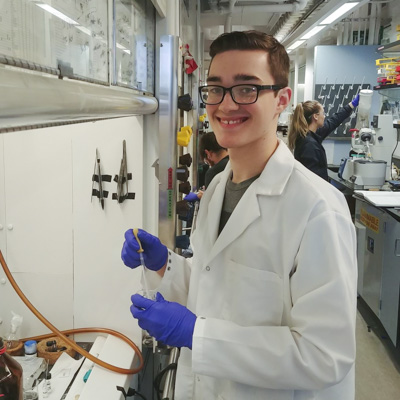
Richard Monsky, a junior biochemistry major in the Honors Program, participated in the NSF REU Program in Chemical Biology at New York University where he spent ten weeks in Dr. Keith Woerpel’s research group. He explored the synthesis of a peroxide-containing molecule that has potential anti-cancer properties. Reflecting on his summer experience, Monsky notes that “although much of my summer work taught me that research can be unpredictable and does not always turn out as planned, I am still deeply grateful for my summer research experience. The REU program is not only invaluable for learning critical lab techniques, but it also gives an insight into the life of a graduate student working in one's field of interest.” This semester, he began working with Associate Professor of Chemistry Dr. Jocelyn Nadeau on synthesizing and studying new organic compounds with interesting optical properties. After Marist, Monsky plans to attend graduate school with the goal of earning a Ph.D. in chemistry.
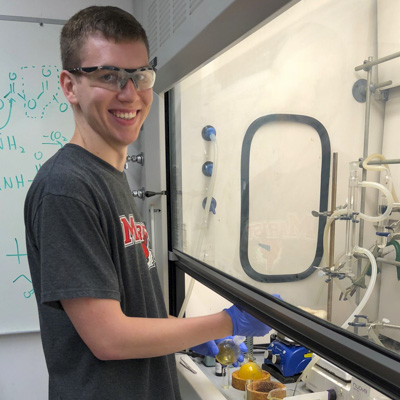
Senior chemistry major, Brett Lucht, participated in the NSF REU Program in Chemistry at the University of Maryland Baltimore County (UMBC) where he spent ten weeks in Dr. Lisa Kelly’s research group. He worked on the synthesis and study of copolymers that translate changes in their chemical environment to changes in their photophysical properties. “During my time in UMBC's REU program this summer,” says Lucht, “I was able to develop my problem solving and research skills. I was exposed to a completely different research environment, and the experience reinforced my desire to attend graduate school to earn a Ph.D. in chemistry.” Lucht has been conducting organic chemistry research with Dr. Nadeau since spring 2018 and will continue throughout his senior year.
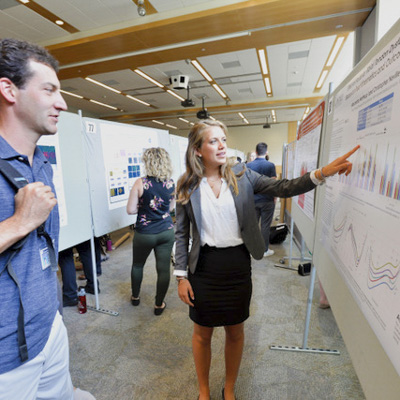
Alexandra Northrup, a junior double major in biomedical sciences and Spanish in the Honors Program, participated in the ten week Summer Undergraduate Research Fellowship (SURF) Program at SUNY Upstate Medical University. SURF programs are also highly selective summer programs that provide undergraduates with meaningful experiences in a research setting at a host institution. She worked alongside physical therapist Dr. Christopher Neville in the Motion Lab of the Institute for Human Performance. Their research focused on studying ways to mitigate an ankle-foot condition called ‘tibialis posterior tendon dysfunction.’ Northrup’s summer research experience “has really been a turning point for me. I have learned a lot about osteopathic medicine and shadowed a variety of doctors, which helped me concretely decide to apply to medical school. The relationships and connections I have made are incomparable, and I cannot put into words how excited and grateful I am for this experience!” Northrup has also been conducting research into the role of genome structure in DNA repair with Assistant Professor of Biology Dr. Paula Checchi since her first year, and her work contributed to a recent publication in the journal Genetics.
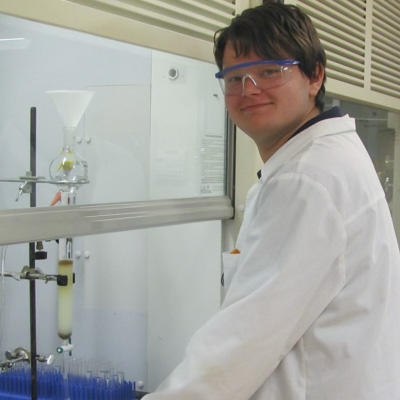
Every summer, several science majors conduct research on Marist’s campus with faculty members in the School of Science. Funding to support these students is provided by the School or private donations. The Dr. J. Richard LaPietra Sponsored Student Research Fund to Enhance Excellence in Chemistry Studies was established in 2011 by Mrs. Barbara LaPietra to honor her husband by supporting a summer research stipend for an outstanding chemistry or biochemistry major. Michael Rosko, a senior biochemistry major, was this year’s Dr. Richard J. LaPietra Summer Research Scholar. Continuing the research he began with Dr. Nadeau during the spring semester, he spent eight weeks working on the synthesis and characterization of fluorescent dyes with applications in the area of organic materials and biological probes. “Being in the lab this summer gave me the confidence I need to succeed in such a setting,” says Rosko, “and I will build on the experience by continuing the project during my senior year. After Marist, I wish to pursue a Ph.D. in chemistry. From there I quite like the idea of teaching, as I would love spreading the joy I find in chemistry to others.”
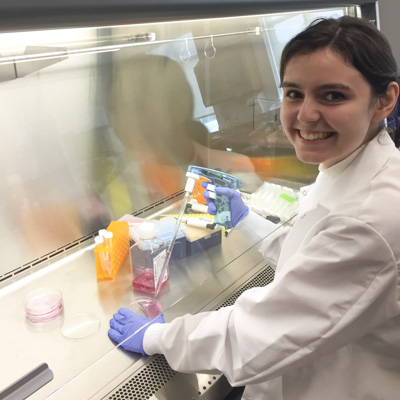
The Marist School of Science Summer Research Program provided two additional eight-week summer research positions on a competitive basis to science majors. This year two seniors, Rebecca Yunker and Brooke Peterson, were selected to participate. Yunker, a senior biology major in the Honors Program, continued the research she began last spring with Assistant Professor of Biology Dr. Megan Dennis on isolating and characterizing cells created by genetic modification using CRISPR. Reflecting on her summer research experience, Yunker notes that “it was wonderful to work in a laboratory setting all summer. It gave me a glimpse of what research feels like when it is your job, and I think it better prepared me for graduate school. I have more of a sense of direction for my future because of my summer research experience.” Yunker will continue her work with Dr. Dennis throughout her senior year, and she plans to pursue a Ph.D. in biology after Marist.
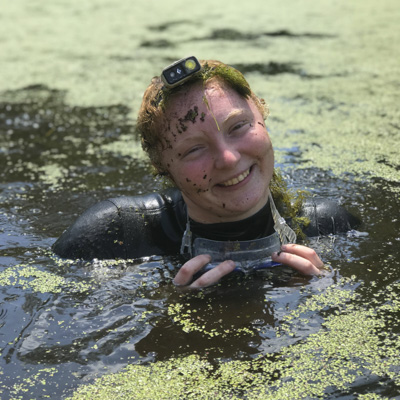
Unlike the aforementioned students who spent their summer conducting research in a traditional laboratory setting, senior environmenal science and policy major Brooke Peterson spent her summer doing research underwater. Working with Assistant Professor of Environmental Science Dr. Zion Klos, she studied the difference in sedimentation rates between artificial and natural wetlands in Arlington, NY, requiring her to put on a wetsuit and dive into the muck to gather data. Peterson states that, “this project made me more firm in my decision to go into ecology and hydrology as it made my already existing love of fieldwork even more concrete. This opportunity also allowed me to work on conserving an endangered species of turtle, something I will forever carry with me. There’s something naturally fulfilling when you are able to help save the life of an endangered species with your own two hands.” Peterson will continue her research with Dr. Klos during her senior year, and after Marist, she plans to pursue a Ph.D. in aquatic ecology.
Undergraduate research has long been an emphasis at Marist in recognition that exposure to real research experiences, whether at Marist or elsewhere, is extremely beneficial for students as they hone their problem solving abilities, practical skills, and scientific knowledge. Last year 19 Marist undergraduates coauthored scientific peer-reviewed research articles, and many presented their work at conferences in venues across the US and Europe. Over the past 12 years, six Marist science majors were named Goldwater Scholars, two received NSF Graduate Research Fellowships, and many others went on to attend top graduate programs. Although the words of these current students convey the personal impact of their participation in undergraduate research, it is also important to note the national significance of these students’ decisions to attend graduate school in the sciences. A strong STEM workforce is critical for maintaining prosperity and competitiveness in the 21st century. Thus, undergraduate research experiences help ensure a vital pipeline of future scientists able to make strong contributions to their disciplines and advance society.



